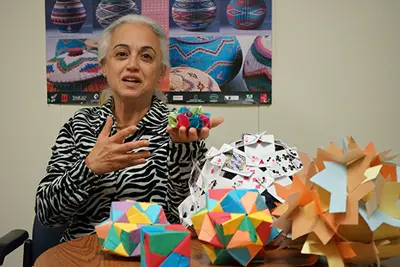Science Teacher Karin Loach Wins 2020 Best Graduate Paper
 Image by Jessica Young
Image by Jessica Young
11/12/2020
By Katharine Webster
Karin Loach ’11, ’20 is an eighth-grade science teacher in Auburn, Mass., and when the state updated its science curriculum in 2016, she began hearing that elementary school teachers felt woefully unprepared to teach it.
She wondered why – and she also began thinking more deeply about how well their students understood basic scientific concepts and methods when they began middle school.
So last year, as a third-year student in the Doctor of Education (Ed.D.) program’s STEM concentration, she decided to turn those questions into her thesis research.
She studied third-, fourth- and fifth-grade teachers in a single elementary school to learn how confident they were in teaching science and achieving the student learning that the state expects. Previous research has shown that teachers’ confidence in their effectiveness correlates to student learning.
“Elementary school teachers would say they weren’t comfortable teaching science, and then students would come to the middle school, and I wondered if they were prepared, because there are so many different science education models at the elementary school level,” Loach says. “I wanted to know what was going on and if the teachers’ confidence and effectiveness in science education could be improved.”
She presented her preliminary conclusions – that teachers generally lacked confidence in their ability to teach science effectively – at the 2020 conference of the Eastern Educational Research Association (EERA) last February, in Florida. She went on to finish gathering and analyzing her data, wrote up and defended her thesis, and graduated in May.
Then last month, she learned that she had won the 2020 EERA Best Graduate Paper award. She will be celebrated at the EERA’s virtual 2021 conference this February.
Loach says she and several other third-year Ed.D. students in the STEM concentration submitted presentation proposals for the 2020 conference at the encouragement of their dissertation chair, Assoc. Prof. Iman Chahine. All were accepted, and the College of Education dean’s office helped the students with their travel expenses.
 Image by Jessica Young
Image by Jessica Young
Loach says the conference was a great experience that helped her prepare to defend her dissertation in April.
“We presented our papers and they were received well,” she says. “And looking at the other work down there, it was sensational.”
Ultimately, her research found that most of the teachers at the school she studied lacked confidence in their ability to teach science effectively. The state’s revision to its science curriculum was the first in a decade, and it was not accompanied by professional development in hands-on science teaching methods, she says.
Loach did find that being part of a grade-level teaching team increased teachers’ confidence slightly. But although a couple of new teachers had higher confidence in their science teaching effectiveness, most said they had not been well-prepared to teach the subject while in school – or since.
Starting in third grade, Massachusetts tests students every year through eighth grade in math and English language arts. Because those test scores are used to evaluate teachers and schools, most professional development for grade-school teachers is focused on math and English, she says.
Only two of the teachers in her study had ever taken a professional development course in science education, although most had a decade or more of teaching experience. She says that needs to change – and so does the curriculum for elementary education majors in the state’s teaching colleges: They need hands-on experience with the kinds of experiments and lessons they will conduct with their students, instead of a college-level lab course in a single subject.
“They should take a specific science course that has them do as their students would do. I think that’s the most effective way of teaching science education,” she says. “Don’t tell me the components of a cell if I’m not going to teach that to my students. Let’s give these future teachers more information that they’re going to use.”
Loach, who earned both her Master of Education in Curriculum and Instruction in science education and her Ed.D. at UMass Lowell, says she got tremendous support in both programs, and learned new methods of approaching science education that she can use in her own classroom.
Now that she has her doctorate, she’s looking for adjunct teaching jobs in colleges of education, where she hopes to better train teacher candidates in STEM education. She’s also considering the possibility of working as a curriculum specialist so that she can improve STEM education within a school or district-wide.
For the moment, though, she’s happy to be teaching without worrying about being a student, too – even though teaching has become more challenging, as her school district is now operating on a hybrid learning schedule, due to the COVID-19 pandemic.
“I did a lot of experiments from my kitchen when we first shut down: the STEM challenge with Pringles potato chips, elephant toothpaste – anything I could think of,” she says.
“Elephant toothpaste is a chemical reaction between hydrogen peroxide and yeast. I had promised my students all year that they could do that, and then they couldn’t – so I did it for them and made a big mess.”




